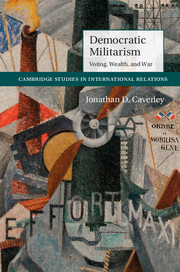Book contents
- Frontmatter
- Dedication
- Contents
- List of figures
- List of tables
- Acknowledgments
- 1 Introduction: sources of democratic military aggression
- 2 Cost distribution and aggressive grand strategy
- 3 Analyses of public opinion
- 4 Analyses of arming and war
- 5 British electoral reform and imperial overstretch
- 6 Vietnam and the American way of small war
- 7 Becoming a normal democracy: Israel
- 8 Conclusion: strategy wears a dollar sign
- Bibliography
- Index
4 - Analyses of arming and war
Published online by Cambridge University Press: 05 July 2014
- Frontmatter
- Dedication
- Contents
- List of figures
- List of tables
- Acknowledgments
- 1 Introduction: sources of democratic military aggression
- 2 Cost distribution and aggressive grand strategy
- 3 Analyses of public opinion
- 4 Analyses of arming and war
- 5 British electoral reform and imperial overstretch
- 6 Vietnam and the American way of small war
- 7 Becoming a normal democracy: Israel
- 8 Conclusion: strategy wears a dollar sign
- Bibliography
- Index
Summary
I take the previous chapter's empirical insight of foreign policy as redistribution to examine the roles of inequality and, most especially, capitalization in allowing democracies to act quite boldly to change the international status quo. To do so, I have developed a new data set incorporating three new measurements of the state's ratio of military capital stock and military personnel.
In spite of recent strides (Signorino and Tarar, 2006; Signorino, 1999), the challenges inherent to statistical analysis of strategic behavior are by now well known, particularly when exploring the factors leading to war or successful deterrence (Fearon, 2002; Schultz, 1999). To paraphrase Mark Twain, often the best a substantive researcher can achieve is to find estimators that rhyme with rather than replicate the formalized relationships between the variables. For this reason and that of data availability, I do not test all the theory's empirical implications. For example, while cost distribution theory suggests that in important conflicts a democracy can experience incentives to fight in a suboptimal manner, the formal model shows that the relationships between capitalization and “winning” or “losing” a conflict are far from straightforward, and are therefore better tested in case studies. Testing whether democracies try harder in terms of defense spending is marred by the non-stationary nature of the data (Lin and Ali, 2009).
- Type
- Chapter
- Information
- Democratic MilitarismVoting, Wealth, and War, pp. 100 - 135Publisher: Cambridge University PressPrint publication year: 2014



